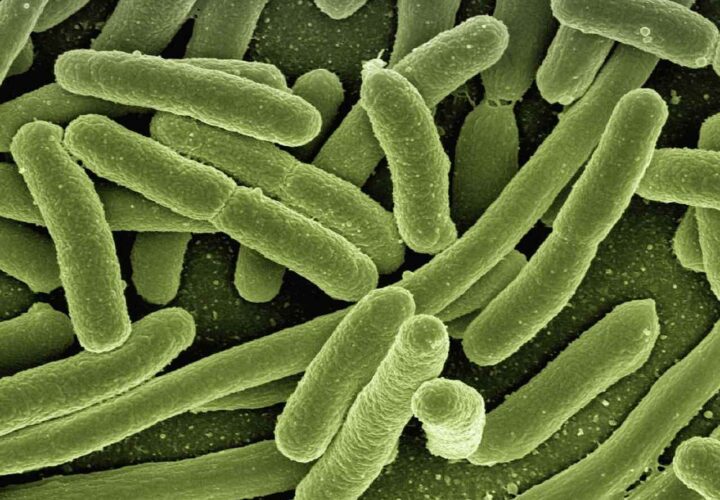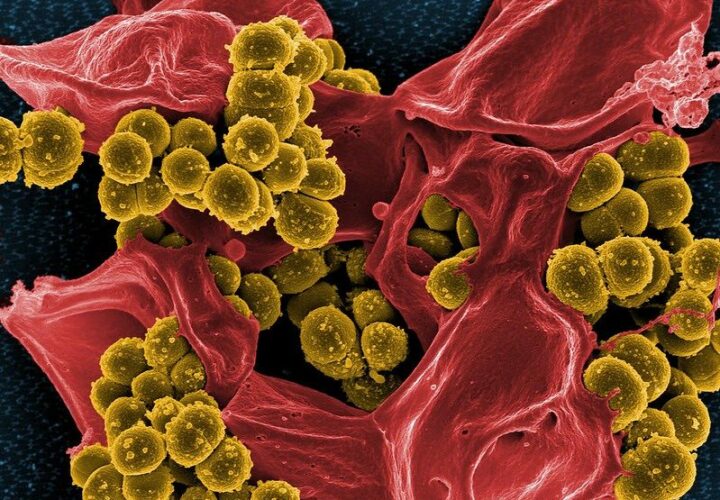Being Patient contributor Simon Spichak, who researches the role of microbes and aging at APC Microbiome Ireland, University College Cork, demystifies the microbiome and what it means for brain health.
The human body is host to trillions of microscopic organisms — collectively called the microbiome — that shape our health across the lifespan. This exciting field of research provides a new approach to understanding and treating cognitive decline and dementia. Unlike the genetic code stored within each of our cells, the microbiome community can be changed easily through diet and other lifestyle factors like exercise. But as we change the microbes in our gut, how do these changes affect the aging brain?
Over millennia, microorganisms co-evolved with humans to form a beneficial working relationship. Our body provides room and board so that microbes digest the foods that our body cannot. After digesting these foods, the byproducts of this process — biological molecules — can exchange signals with different cells within the human body.
During birth, the infant is exposed to their first set of microbes, which make their way to the gastrointestinal tract. Early in life, the gut microbiome is involved in immune, gut, and nervous system development. As an infant develops and grows, the community of microorganisms within the gut stabilizes — reflecting their diet and environment. Think of a stable gut microbiome like a healthy forest community with many different organisms serving a unique role within the ecosystem.
But as the body ages, this healthy ecosystem begins to lose its stability. Around that same time, many older adults may experience cognitive decline or various forms of dementia. Postdoctoral Researcher Marcus Boehme at APC Microbiome Ireland, University College Cork, and colleagues, believe age-related alterations in the microbiome could go hand in hand with changes in brain function.
“We know that the gut microbiome plays a critical role for our health,” Boehme said. “As we get older, our microbiome changes and may also impact our brain.”
This link is supported by evidence. Several studies have compared the microbiomes of healthy adults with those who have dementia, finding unique bacterial signatures in each group. Research has also shown that microbial signatures are also associated with frailty and health in aging adults. In contrast, people who live relatively healthy lives beyond the age of 100 — known as super-agers — also harbor a unique microbiome.
There is still much to learn about the relationship between our brain health and our gut microbiome. Studies are underway, searching for answers as to why the composition of this microbial community changes in dementia, and whether changes in the microbiome actually cause changes in cognitive function.
Could Feces Pave the Way to the Fountain of Youth?
Studies in fish and mice have shown that transferring the bacteria found in feces of young fish and mice improved longevity and cognition in older animals, showing the possibility of this connection in humans.
“It’s incredible what we’re seeing,” said Katie Guzzetta, a PhD student at APC Microbiome Ireland, University College Cork and co-author of one such recent study. “We knew that the community of gut microbes shifts during the aging process, coinciding with other metrics of health. But for the first time, we’ve shown that microbes can play a causal role in slowing or reversing the process of aging in the brain.”
“We do, of course, need to add caution to over-interpreting our findings,” Guzzetta added. “Our study was conducted in mice, and there still is a long way to go before we may see something similar trialled in humans.”
Boehme, co-first author on the study, said of the research, “We have now been able to show that if we take the gut microbiome from young mice and transfer them to old mice, that we can rejuvenate the brains of these old mice, basically turn their clock back. We were able to reverse specific aspects that occur in old age with regards to changes in metabolism and changes in the immune system to a status that were similar to those of young mice. Remarkably, the performance of older mice improved in several cognitive tests for learning, memory and they were more active and less anxious.”
Boehme added that the results suggest that the gut microbiome has “remarkable therapeutic potential” for treating age-related cognitive decline and slowing brain aging. “Our results suggest that the fountain of brain youth may lie in the gut,” he said.
Emerging from this fascinating research are several new avenues aimed at improving brain health through the gut.
A Microbiome-Based Treatment for Alzheimer’s
Shanghai Green Valley Pharmaceutical has developed the first microbiome-based therapeutic for Alzheimer’s, with promising results in mild to moderate Alzheimer’s in China. The drug has been approved in China, and in 2020, it received approval from the United States Food and Drug Administration for testing in the U.S. The drug, sodium oligomannate, is an extract made from seaweed and kelp, food for gut bacteria.
According to studies in humans, the gut bacteria digest this food, initiating a domino effect within the ecosystem — including alterations in the microbiome, peripheral immune cells, and neuroinflammation. It is akin to introducing more native flowers for pollinators in a forest; this one small change can make the ecosystem a little healthier.
Want to learn more about clinical trials
for Alzheimer’s and dementia?
Check out the Lilly Trial Guide.
In sodium oligomannate’s Phase 3 trial conducted in China, the drug led to cognitive improvements over 36 weeks. It was also well-tolerated and did not cause significant side effects.
Trials are currently underway. Whether or not further trials show this drug is effective, it provides a blueprint for developing new gut microbiome-based therapeutics for mild to moderate cognitive impairment and dementia.
While sodium oligomannate is not yet approved for use by the FDA, there are other ways to promote a healthy gut — and possibly in turn, a healthier brain.
Feeding the Gut Microbiome
While the multi-billion-dollar probiotics market would have us believe otherwise, there isn’t a single secret pill or superfood that will supercharge the microbes in your gut. Instead, healthier food choices, such as the Mediterranean diet, have been found to improve both the health of the gut microbiome and cognition in older populations. Several studies found that eating a healthy Mediterranean diet — which is rich in fruits, vegetables, legumes, nuts, seeds, and fish — reduced the risk of developing mild cognitive impairment or dementia.
You might also be wondering about the rows upon rows of products with beneficial microbes, marked probiotics, on the shelves of your grocery store or pharmacy. Many products in the U.S. are inadequately labeled and may not adhere to the definition of a probiotic, making it unclear whether the bacteria survive the stomach acid and reach the gut. In the European Union, probiotic labeling is a lot stricter — requiring evidence that a certain amount of ingested bacteria confers a beneficial effect.
Instead of probiotics, experts recommend looking towards transitioning to a Mediterranean diet. Other ways to maintain a healthy microbiome include reducing levels of stress and exercising regularly. While there aren’t any approved gut microbiome therapeutics that confer benefits to the brain outside of China, research proves all of these microbiome-friendly lifestyle choices will help you and your microbes age healthily. In the meantime, microbiome scientists are hard at work developing potential new microbiome treatments for Alzheimer’s and related dementias.




I understand the importance of the Med diet but no mention of eating foods like kefir, yogurt etc. to beef up the microbiome.